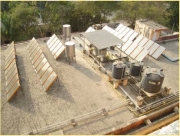 This report for the Ministry of New and Renewable Energy (MNRE) deals with the development of an area based Energy Service Company (ESCO) model for solar water heating in India. Internationally, Solar Water Heating (SWH) has been identified as one of the most promising decentralized solar applications, having significant potential to reduce electricity consumption and consequent emissions reduction. Several schemes for promotion of solar water heaters have been in operation in the country.
This report for the Ministry of New and Renewable Energy (MNRE) deals with the development of an area based Energy Service Company (ESCO) model for solar water heating in India. Internationally, Solar Water Heating (SWH) has been identified as one of the most promising decentralized solar applications, having significant potential to reduce electricity consumption and consequent emissions reduction. Several schemes for promotion of solar water heaters have been in operation in the country.
However, in order to achieve scalability in these measures and to achieve the objectives of SWH penetration, there is a need to extend the existing schemes and design innovative service delivery mechanisms to leverage SWH investments. One such model is the Fee-for-Service model where people buy a service, in this case hot water, from an ESCO, rather than energy to perform the service (e.g. purchasing electricity so it can be used to heat water).
An ESCO is defined as a company that would install, own and operate renewable energy systems, which in this case would be SWH systems and provide energy services to consumers. Such companies are characterized by the following features -
- It guarantees the energy savings and/or provision of the same level of energy service at lower cost;
- Its remuneration is directly tied to the energy savings achieved;
- It can either finance, or assist in arranging financing for the installation of an energy project they implement by providing a savings guarantee.
A detailed assessment of the Energy Performance Contracting Models and Energy Supply Contracting Models was carried out in this study. Along with this, a fairly detailed stakeholder consultation was carried out among existing SWH based hot water service providers in India. Based on this, various types of business models for operation of SWH ESCOs in India have been proposed in this report. From MNRE’s perspective, this study is intended to draw out a set of implementation guidelines for facilitating service based delivery of hot water through SWH systems. As mentioned earlier, such a delivery model has the potential to scale solar water heating development in the country.
This study is intended to address the above objective of MNRE and frame a set of implementation guidelines in this regard. The limited experience in SWH ESCO models reveals that -
- Monitoring and verification of hot water service is critical in an SWH ESCO model even though metering of hot water in some applications may be a challenge;
- Commercial operation risks – it is extremely important to address payment default risks by certain category of end-users;
- ESCO model is techno-economically more efficient to cater to large volumes of hot water, typically in industries and large institutions;
- Rather than catering to individual demand segments, an area based approach comprising of a cluster of different types of demand segments can reduce the risks for an ESCO;
- Given the nature of business and the type of risks involved, the ESCO will need necessary support from the Government and will be accountable for any kind of financial incentive that is provided.
These various risks would need to be appropriately addressed in order to ensure successful operation of the program. Considering the significant SWH potential in the country, a properly designed area-based ESCO program will contribute significantly in scaling-up solar water heating development in the country.